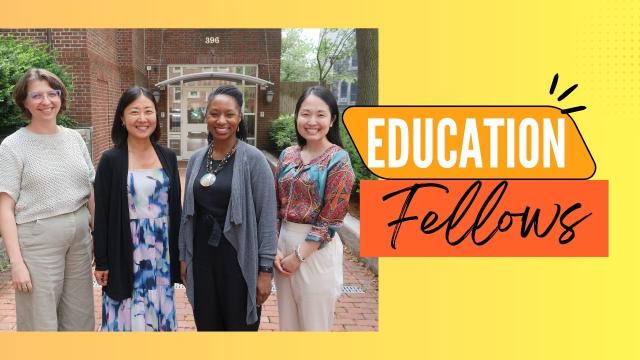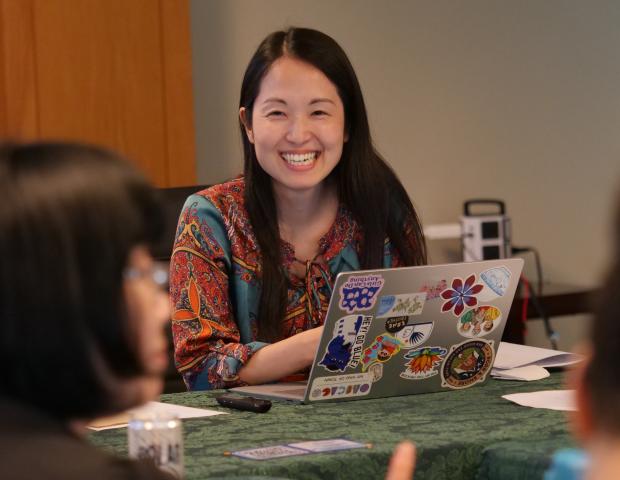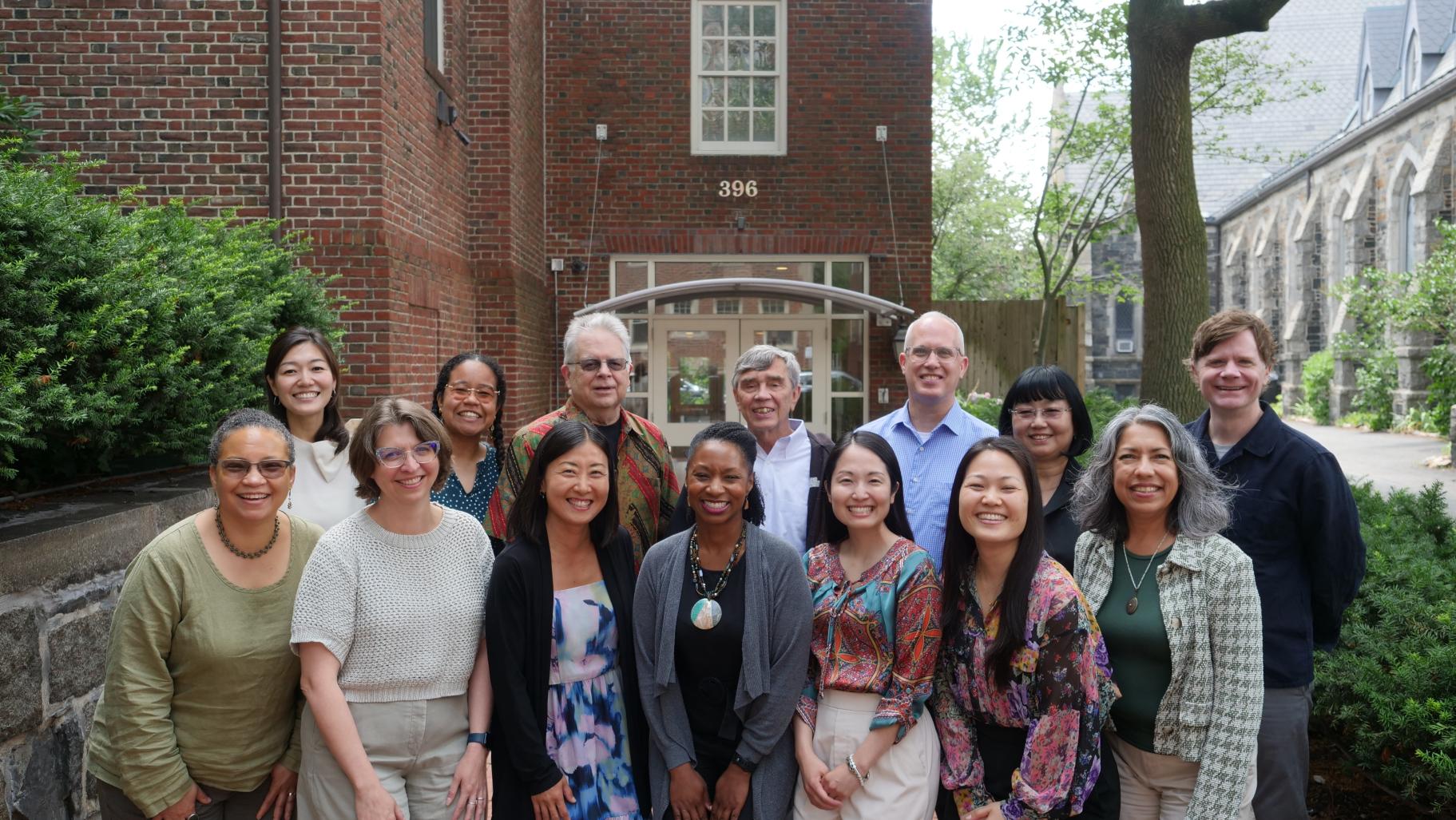Education Fellows
The Education Fellows Program was established by the Ikeda Center for Peace, Learning, and Dialogue in 2007. The program honors the educational legacy of global peacebuilder and Center founder, Daisaku Ikeda, and aims to advance research and scholarship on the internationally growing field of Ikeda/Soka studies in education.
This field coheres around historical, conceptual, and empirical scholarship on the philosophies and practices of Japanese educators Daisaku Ikeda, Josei Toda, and Tsunesaburo Makiguchi, and the soka, or “value-creating,” approaches they have enacted and inspired worldwide. These philosophies and practices undergird the Soka kindergartens, primary and secondary schools, women’s college, and universities in seven countries across Asia and the Americas; inform non-Soka public and private schools and universities in various countries; and shape the practices and perspectives of thousands of educators and school leaders in diverse multicultural, multiracial, and multilingual contexts. The past decade in particular has witnessed remarkable developments in the field of Ikeda/Soka studies in education, including the establishment of numerous university-affiliated research initiatives and institutes, courses and degree programs, scholarly publications and translations, and regular presentations at international conferences.
Background and scope of Ikeda/Soka studies in education.
Mission of the Ikeda Center for Peace, Learning, and Dialogue
Our mission is to build cultures of peace through learning and dialogue inspired by Buddhist humanism. Specifically, we work to establish a shared global ethic across cultures and religions—an ethic based on respect for the absolute sanctity of life itself, a firm belief in the human potential for good and for transforming the world, and a clear recognition of the interdependence of all life.
In addition to the Education Fellows Program, our programs include the development of multi-author books on topics in peace, learning, and dialogue; an annual Ikeda Forum for Intercultural Dialogue; and “Dialogue Nights” for college students and young professionals; a seminar series for graduate students on the topic of global citizenship; and Indigo Talks, a speaker series featuring renowned intellectuals engaging with the works of Center founder Daisaku Ikeda. These programs are inspired by founder Daisaku Ikeda’s belief that open-hearted, open-minded dialogue presents humankind with the surest path to peace.
Focus of research
The Ikeda Center Education Fellows Program supports doctoral dissertations in the field of Ikeda/Soka studies in education, including its relation to the philosophy and practice of education more generally. (View a bibliographic guide to relevant English-language sources on Ikeda/Soka studies in education here.)
We invite a wide range of approaches, including dissertation research that examines intrinsic and extrinsic dimensions of Ikeda/Soka studies in education. By “intrinsic” we mean the historical and primary texts by Makiguchi, Toda, and Ikeda in Japanese and in the contexts in which they were written; by “extrinsic” we mean these texts and their ideas in translation and application in various contexts and disciplines.
Awards and Conditions
Up to three Ikeda Center Education Fellows will be selected by an Advisory Council of leading education scholars each application period. Fellows will be eligible for two years of funding at $10,000 per year, with the second year contingent on proof of progress. Fellows will be expected to submit a final written statement along with their dissertation and abstract upon completion. In addition to the basic stipend, each fellowship also covers costs of mandatory attendance at a one-day seminar with a distinguished advisory panel at the Ikeda Center in Cambridge, MA. This seminar will take place halfway through the program and fellows will be asked to make a presentation of their preliminary research findings.
View photos from the 2025 Education Fellows seminar or read a report from the 2023 Education Fellows Seminar.
In addition, successful candidates should be willing to participate whenever feasible in future networking activities to advance research in Ikeda/Soka studies in education. Examples include:
- presenting research results at regional and national education conferences;
- interacting with past and current fellows as well as advisors as needed; and
- participating in seminars and public conferences at the Ikeda Center in Cambridge, MA.
Dissertations by Past Fellows
DaVeeda L. Clark, Georgia Southern University, “Pursuit of Happiness in Life and Education: Queer and Womanist Perspectives and Value-Creating Approaches~A Black Speculative Memoir” (2024)
Alankrita Chhikara, Purdue University, “Becoming Global Citizens: A Narrative Inquiry Into South Asian International Students’ Forms of Activism from a Soka Perspective” (2023)
Debbie Goss, Indiana University of Pennsylvania, “Global Citizenship Writing Pedagogies: A Perspective from the Field of Ikeda/Sōka Studies” (2022)
Kendrick D. Johnson, DePaul University, “Dancing in the Liminal Tension: A Phenomenological Study of how Queer Black Boys Manifest Happiness in an Urban Midwest High School” (2021)
Nozomi Inukai, DePaul University, “The ‘Being’ and ‘Doing’ of a ‘Good Teacher’ from a Soka Perspective” (2020)
Vicki Mokuria, Texas A&M University, “Turning Poison into Medicine: Exploring the Transformative Power of Soka Educational Philosophy through Narrative Inquiry” (2019)
Melissa Bradford, DePaul University, “Friends in the Orchid Room: An Inquiry into Value-Creative Dialogue” (2018)
Julie Nagashima, University of Pittsburgh, “The Meaning of Relationships for Student Agency in Soka Education: Exploring the Lived Experiences and Application of Daisaku Ikeda’s Value-Creating Philosophy through Narrative Inquiry” (2017)
Mahi Takazawa, University of San Francisco, “Exploration of Soka Education Principles on Global Citizenship: a Qualitative Study of U.S. K-3 Soka Educators” (2016)
Gonzalo Obelleiro, Columbia University, “Cosmopolitan Education and the Creation of Value” (2014)
Eligibility
* The call for applications is now closed. Questions regarding the program may be sent to fellows@ikedacenter.org.*
1. Applicants must be candidates for a doctoral degree and must confirm via the application that they are in or beyond their final year of coursework by the start date for the fellowship [Fall 2024].
2. Applicants must be enrolled in an accredited university in the United States or Canada.
3. All materials must be submitted in English (The dissertation prospectus should be formatted in APA 7th ed. or Chicago Manual style).
Meet our 2024-2026 Education Fellows

The task of education must be fundamentally to ensure that knowledge serves to further the cause of human happiness and peace.
Daisaku Ikeda, Thoughts on Education for Global Citizenship, Teachers College, 1996

